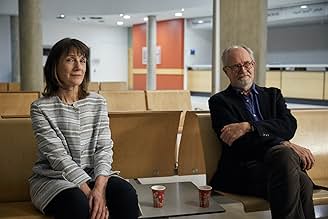Un homme est hanté par son passé et se voit offrir un héritage mystérieux qui le pousse à repenser son existence actuelle.Un homme est hanté par son passé et se voit offrir un héritage mystérieux qui le pousse à repenser son existence actuelle.Un homme est hanté par son passé et se voit offrir un héritage mystérieux qui le pousse à repenser son existence actuelle.
- Réalisation
- Scénario
- Casting principal
- Récompenses
- 1 victoire au total
Avis à la une
Jim Broadbent is one of the greatest actors of the late 20th and early 21st Century. I've seen him in many films, and he always inhabits his role as if he were, indeed, that person. Dame Margaret Webster is a fine actor, and has appeared in dozens of movies and made-for-TV specials. However, I think the only time I've seen her on screen was as the vile Fanny Dashwood in Sense and Sensibility (1995). She does a highly professional job as a embittered woman, whose life is absorbed by her business interests.
Michelle Dockery looks as if she just changed costumes and walked into this movie from Downton Abbey. She is always angry and depressed. For the record, her part is small and non-central in this film. I think she wants to broaden her range, but that didn't happen here. Could she ever star in a comedy?
Charlotte Rampling was one of the most beautiful women in movies. At age 70, she still is one of the most beautiful women in movies. She is not only beautiful, but she is a consummate actor who is made for this role.
This film is complicated. About 75% of it takes place in present time, and about 20% takes place in flashback. (The other 5% are dream and imaginary scenes, when the present enters into the past.) You'll have to pay close attention or you'll miss the point. In fact, during the middle of the film, I missed the point. However, towards the end, it all came together and made sense.
(Incidentally, there's a tedious sequence in the beginning, when Tony gets a certified letter, and he almost opens it, then he sort of opens it, then he opens it and doesn't read it, and finally, finally reads it. The letters starts off the entire plot, so he needs to read it, and we need to know what it says. That's the only weak part of the movie.)
We saw this film at the excellent Little Theatre in Rochester, NY. Even though it's meant to be seen on the large screen, it will work well on the small screen. This movie has a ridiculously low IMDb rating of 6.5. It's much better than that. This is one of those ratings that you have to ignore. Don't miss this movie just because it's rated so low.
P.S. Relevant to The Sense of an Ending: The Moving Finger writes; and, having writ, Moves on: nor all thy Piety nor Wit. Shall lure it back to cancel half a Line, Nor all thy Tears wash out a Word of it." From the Rubaiyat of Omar Khayyam.
Tony Webster (Jim Broadbent) is a disagreeable, semi-retired 70-something curmudgeon living in London. He used to make his living as a doctor, but now he owns a small vintage camera shop. Tony is long divorced from Margaret Webster (Harriet Walker), but they remain quite friendly, mutually supporting their pregnant single daughter, Susie (Michelle Dockery from TV's "Downton Abbey"), and sometimes meeting to discuss their lives over a spot of tea. Obviously comfortable (if not entirely happy) living out the narrative of his life (as he sees it), Tony is about to be shaken out of his complacency.
Dr. Webster receives a letter informing him that he has been bequeathed an old diary by the recently departed mother of his college girlfriend. Questions abound. Tony wants to know whose diary it is. When he tells his ex-wife about the letter, she's curious why the mother of a long-lost love would be leaving him anything in her will. As Tony struggles with the family's lawyer to get his hands on the diary (or at least get some answers), he begins telling Margaret stories from a past that he has never before shared. She gets frustrated when she senses that he isn't telling her the whole story, while the audience is left to wonder what he's leaving out, why he's leaving things out and if he even realizes he's doing it.
Tony's story slowly unfolds (and is later revisited and built upon) in flashbacks throughout the movie. As a young man, Tony (played during his school days and college years by Billy Howle) begins dating the young, fetching and quirky Veronica Ford (Freya Mavor). As they figure out how they really feel about each other and where their relationship is going, Tony spends a weekend at her family's country cottage, where Tony hits it off with Veronica's mother, Sarah (Emily Mortimer). Eventually (not a spoiler – it's in the theatrical trailer), young Tony's best friend, the very intelligent but very maudlin Adrian Finn (Joe Alwyn) emerges as a rival for Veronica's affections. As a mystery unravels both in old Tony's rearview mirror and in his present, he finds old Veronica (Charlotte Rampling) and demands answers.
"The Sense of an Ending" is a relatable, entertaining and thought-provoking character-driven drama. This impressive collection of English thespians all give heart-felt and layered performances, while Nick Payne's script and Ritesh Batra's direction sensitively and insightfully develop the story, but still leave room for individual interpretations. How a person sees this film will have as much to do with his or her age, perceptions and individual experiences as the story itself. And when all is said and done, the film's ending still leaves room for discussion among Movie Fans. Rather than a clearly defined ending, we get the sense of an ending. Or is it a beginning? It's for each of you to decide for yourselves. Getting there does require you to go along for the ride on a slow-moving cinematic train, but it's well worth the journey – especially since you may be surprised where you end up. "A-"
More questionably, the movie version of "The Sense Of An Ending" has a different ending which is not that of the author Julian Barnes or even that of the scriptwriter, the playwright Nick Payne, but essentially that of the director, Indian film-maker Ritesh Batra (who made the delightful work "The Lunchbox"). The film offers us a conclusion which is more definitive and more upbeat that the novel but that is perhaps the nature of this different medium.
"The Sense Of An Ending" is slow and serious but not all films can be "Fast And Furious". The pacing allows the viewer to admire the wonderful acting, primarily from Jim Broadbent as the narrator, retired and divorced Tony Webster, but also from some fine actresses, notably Charlotte Rampling, Harriet Walter and Emily Mortimer, plus some new young actors.
Like the source novel, this film is a challenging and moving examination of the malleability of memory. As Tony puts it: 'How often do we tell our own life story? How often do we adjust, embellish, make sly cuts?' How often indeed ...
From flashbacks to the 1960s, we learn he was involved with a lass called Veronica and met Adrian, a charismatic student. A thoughtless act leads to, or may not have led to, tragedy.
How much of Tom's history (shown in the flashbacks) is true and how much is a distortion of his memory, is open to question.
Meanwhile, Tom's life in the present continues. His daughter is close to giving birth which means regular meetings with his former wife. This gives Tom an opportunity to discuss the past. By staying alert and listening in to the conversations closely and watching the flashbacks carefully, clues emerge for us to discern the truth.
Six fellow film fans and I saw the movie together and met for lunch afterwards. Our interpretations differed. An indication that we'd seen an exceptional film.
There were things we agreed on: the ensemble cast was outstanding; the editing was first-rate; the music unobtrusive; and the director's touch admirable.
Various actions of the major characters and possible actions not actually shown on screen were raised and analysed with the results agreed to by some, rejected by others.
It's not a film for everyone but for those who enjoy a movie where clues are given but interpretations are left to the viewer, this one's for you.
It's a movie that stays with you for days.
Le saviez-vous
- AnecdotesAt a festival screening in San Francisco, Ritesh Batra said that he had tea with Julian Barnes, author of The Sense of an Ending, ahead of filming. Batra was so nervous at meeting Barnes that he subsequently forgot most of their conversation, save for Barnes's parting line, spoken in jest: "Go ahead and betray me."
- GaffesYoung Tony affixes a 'first-class' stamp to his fateful letter, sent in 1967. This sort of stamp was not produced for another 26 years (in 1993).
- Citations
Tony Webster: [Voice over] When you are young you want your emotions to be like the ones you read about in books. You want them to overturn your life and create a new reality. But as that second hand insists on speeding up and time delivers us all too quickly into middle age and then old age, that's when you want something a little milder, don't you? You want your emotions to support your life as it has become. You want them to tell you that everything is going to be okay. And is there anything wrong with that?
- ConnexionsFeatured in Power of Memory: Making 'The Sense of an Ending' (2017)
- Bandes originalesPsychotic Reaction
Written by Sean Byrne (as J. Byrne) / John Michalski (as J. Michalski) / Craig Atkinson (as C. Atkinson) / Ken Ellner (as K. Ellner) / Roy Chaney' (as R. Chaney)
Performed by Count Five
Published by Bucks Music Group Ltd / The Bicycle Music Company
Licensed courtesy of The Bicycle Music Company
Meilleurs choix
- How long is The Sense of an Ending?Alimenté par Alexa
Détails
- Date de sortie
- Pays d’origine
- Site officiel
- Langue
- Aussi connu sous le nom de
- The Sense of an Ending
- Lieux de tournage
- Sociétés de production
- Voir plus de crédits d'entreprise sur IMDbPro
Box-office
- Montant brut aux États-Unis et au Canada
- 1 274 420 $US
- Week-end de sortie aux États-Unis et au Canada
- 39 692 $US
- 12 mars 2017
- Montant brut mondial
- 5 081 495 $US
- Durée
- 1h 48min(108 min)
- Couleur
- Mixage
- Rapport de forme
- 2.35 : 1










































